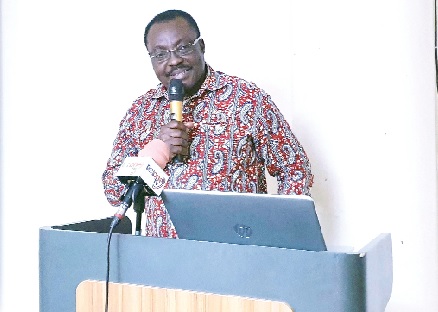
Prostate cancer can’t be prevented
An Oncology and Radiotherapy Consultant at the Korle Bu Teaching Hospital, Prof. Joel Yarney, has encouraged men to psyche themselves to deal with the prostate cancer menace once they are of age since it is not preventable.
He said prostate cancer was not meant for certain categories of people but rather all men were susceptible.
Prof. Yarney was contributing to a panel discussion at a public engagement on prostate cancer organised by the Ghana Atomic Energy Commission (GAEC), in partnership with the Society of Medical Physicists and the University of Ghana Medical Centre, in Accra last Thursday.
The lecture formed part of GAEC's 60th anniversary celebration.
Other panellists were a Radiation Oncologist, KBTH, Prof. Verna Vanderpuye; a Radiologist, KBTH, Dr Samuel Asiamah; a Medical Physicist of the Komfo Anokye Teaching Hospital (KATH), Dr Eric Addison; and Dr Emmanuel Asante, Urologist, University of Ghana Medical Centre (UGMC).
Vulnerability
Prof. Yarney said though all men were susceptible to prostate cancer, it was more prevalent among blacks aged 40 and above.
"It could be worse among those with family history because they are at a higher risk of being diagnosed of prostate cancer earlier than expected," he said.
Dr Asante, however, played down a research conducted in the United States of America and Australia to the effect that men had to ejaculate, at least 21 times a month, to avoid the disease.
He said that research was misleading because all the respondents were whites aged 50 and above.

He also found it a bit strange because ejaculation could not only be limited to sexual intercourse but also masturbation and bedwetting
He, therefore, cautioned the public to be wary of such research being displayed on social media and rather seek early diagnosis and treatment.
Prof. Yarney said the fact that one showed signs of prostate cancer did not necessarily mean that they had it.
Solutions
In finding solutions and accurate mechanisms to detect the disease, Prof. Yarney appealed to the government to, as a matter of urgency, get a Positron Emission Tomography (PET) machine to enhance the treatment of the disease.
He said the machine had the ability to pick cancers that "were travelling" within the body, which was far better than the conventional CT scans and MRI.
Touching on the two methods of treatment - surgery and radiation - he said the factors that caused delay in treatment were fear, finance and symptom interpretation.
For his part, Prof. Vanderpuye urged the state to roll a portion of the treatment onto the National Health Insurance Scheme (NHIS) to save lives.
However, Dr Addison observed that some men were unable to survive the disease due to late reporting of cases.
He said the disease could be treated with ease if only men would muster the courage of running regular tests once they hit 40 years.
Policy
In his defence, the Chief Programme Officer (Director), Allied Health, Ministry of Health, Dr Ignatius A. N. Awinibuno, said the ministry over the last three years had rolled out a non-communicable disease policy which had prostate cancer and other cancers embedded in it.
The policy, he said, outlined the objective and strategy for cancer treatment.
Among the strategies include documenting over 50 prostate cancer cases and establishing a cancer registry to form the basis for tracing and offering help.
It is also to improve effective diagnosis and treatment through evidence-based and cost-effective interventions, promote healthy diet eating habits, physical activities by all Ghanaians, workplace fitness programmes and legislation, banning of smoking at public places as well as screening, early detection and treatment.
